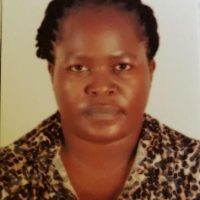
Etheldreda Nakimuli-Mpungu
Etheldreda Nakimuli-Mpungu is a rising researcher and clinician doing innovative work in mental health and HIV in sub-Saharan Africa. She is a Senior Lecturer and psychiatric epidemiologist in the Department of Psychiatry at Makerere University College of Health Sciences (MakCHS) and head of the consultation–liaison psychiatric service at Mulago National Referral Hospital, Kampala, Uganda. Almost a decade ago, she recalls that “around that time, there were researchers who had resolved that Africans cannot comprehend psychotherapy; therefore, they gave persons living with HIV antidepressants as first-line treatment for mild-to-moderate depression in their research studies. In fact, there was an NIH funded grant in my department at the time that was evaluating the use of antidepressants for depression among people living with HIV. I said to myself, but this is not right because antidepressants are not the first-line treatment.” She “strongly believed that what we should be doing was to develop culturally appropriate psychotherapy for depression” in this population.
Nakimuli-Mpungu’s PhD had shown depression was fairly common among patients attending rural HIV clinics in Uganda and it affected their adherence to antiretroviral treatment. She successfully submitted a research proposal to Grand Challenges Canada and, together with her colleagues, teamed up with Edward Mills in Canada to develop and test in a pilot trial a culturally sensitive group support psychotherapy (GSP) for people with mild-to-moderate major depression and HIV. Nakimuli-Mpungu and colleagues went on to complete a cluster randomized trial to evaluate the model on a large scale, with trained lay health workers delivering the GSP. They showed that the effect of GSP on depression was sustained at 2 years, and treating depression resulted in improved adherence to antiretroviral medication.
Nakimuli-Mpungu and colleagues are now seeking to replicate their work on GSP outside of Uganda. “That is the next step…If we have that evidence as well, then we’re at the stage of scaling up.” They are also adapting their model for young people aged 10–18 years and are creating an online platform to deliver psychotherapy because, she notes, the COVID-19 pandemic has created a need for digital health. Mills, Professor at the department of Health Research Methods, Evidence, and Impact, McMaster University, Hamilton, ON, Canada, comments: “Ethel is among the most important clinical researchers in Africa as she has the unique ability to ask important questions, get the clinical trials funded and conducted reliably, and personally analyses the data. Very few researchers anywhere can do all of this themselves.” Her parents encouraged Nakimuli-Mpungu to pursue medicine. “Our parents really wanted us to get educated and become worthwhile citizens”, she says. “My earliest memory was that my mum used to say that girls become doctors”. Fortunately, Nakimuli-Mpungu found sciences interesting and excelled in them. She studied medicine at MakCHS, graduating in 1999. Her path to psychiatry and research came during a job as a medical officer at Butabika National Referral Mental Hospital in Kampala. She initially thought she would be working in the hospital’s general ward. But when she arrived, she was assigned to the female psychiatric ward and told to start seeing patients. “Almost immediately, I noticed there were really physically sick people on the psychiatric ward, and I had never seen this in my training. Very sick people: wasted, coughing, chronic diarrhoea. It didn’t take long to realise that these were patients with HIV.” But she could find little information on HIV and mental health in her psychiatric textbooks and searched online for research on HIV and mental disorders. “When I read those papers, immediately I said, I think this is the research I should also be doing, here in these patients who I’m seeing on a daily basis.” Butabika Hospital gave her a scholarship and she enrolled in the masters in psychiatry programme at MakCHS in 2003, graduating in 2006. Her research was a comparative study of primary mania versus secondary mania of HIV/AIDS. “It was, to my knowledge, the first time on the African continent that that kind of research was done”, she says. In 2007, she was awarded an International Fulbright Science and Technology Award for PhD studies and went on to complete her PhD in psychiatric epidemiology at Johns Hopkins University, Baltimore, MD, USA, in 2012. Seggane Musisi, Professor of Psychiatry at MakCHS’s Department of Psychiatry, describes Nakimuli-Mpungu as “a bright and gifted scholar…She has impacted Ugandan and world psychiatry by working to improve access to care of stigmatised, marginalised, and hard to reach people with severe mental illness in LMICs.”
Nakimuli-Mpungu believes the mental health focus in Uganda needs to shift. “The problem in Uganda, maybe not only in Uganda, is that our focus is on the extreme end of the mental health spectrum, severe mental disorders…I feel that we should prioritise mental health. This requires creating awareness, education, and identifying the mild cases and then you step in at that stage…All health workers need to have at least the basic knowledge; they need to learn simple mental health screening to recognize depression. And when you identify a problem, immediately do something, give them an intervention. This does not call for specialised health workers because they’re not there. But we all have mental health, and our mental health needs to be taken care of. Otherwise, it makes our physical health worse, we can’t work, so we can’t develop our communities.”
Other Members

